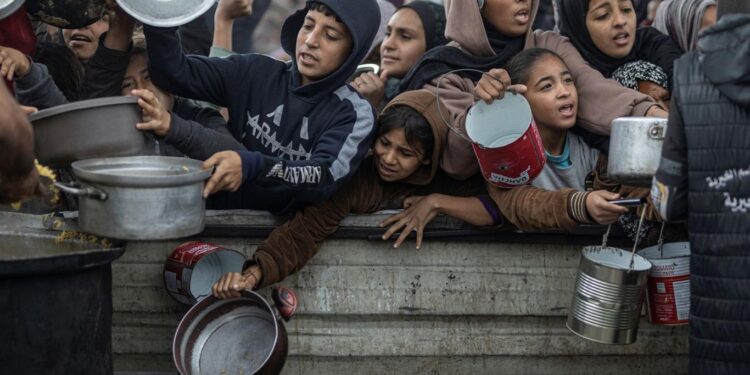Malnutrition rates in Gaza have surged to alarming levels, the World Health Organization (WHO) has warned in its latest report. The escalating health crisis is attributed to ongoing conflict, economic hardship, and restricted access to essential food and medical supplies. WHO officials emphasize that urgent international intervention is needed to address the deteriorating nutrition situation, which is disproportionately affecting vulnerable populations, including children and pregnant women.
Malnutrition Crisis Deepens in Gaza Amid Ongoing Conflict and Blockades
The humanitarian situation in Gaza has deteriorated sharply as malnutrition rates soar to unprecedented levels, according to recent data released by the World Health Organization (WHO). Prolonged conflict combined with stringent blockades has severely restricted access to essential food supplies and medical care, leaving vulnerable populations, particularly children and pregnant women, at grave risk. Hospitals are overwhelmed with cases of severe acute malnutrition, with many facilities lacking the necessary resources to manage the crisis effectively. Health experts warn that without immediate intervention, the long-term health consequences could be devastating for an entire generation.
Key factors contributing to this crisis include:
- Disrupted supply chains limiting availability of nutrient-rich foods
- Widespread poverty exacerbated by loss of livelihoods
- Damaged infrastructure impeding delivery of healthcare and aid
- Psychosocial stress impacting dietary habits and child development
| Indicator | Current Rate | WHO Emergency Threshold |
|---|---|---|
| Child Wasting (Severe Acute Malnutrition) | 15.4% | 10% |
| Stunting in Children Under 5 | 39.7% | 30% |
| Maternal Anemia | 48.2% | 40% |
WHO Highlights Impact on Children and Vulnerable Populations in the Region
The latest findings from the World Health Organization underscore a devastating surge in malnutrition, particularly among children and other vulnerable groups within Gaza. The scarcity of essential nutrients has led to a significant increase in cases of stunted growth, wasting, and micronutrient deficiencies, severely compromising the physical and cognitive development of young children. Health services face overwhelming demands, with local clinics reporting an urgent need for nutritional supplements, ready-to-use therapeutic foods, and enhanced maternal care programs.
Beyond children, pregnant and lactating women, elderly individuals, and persons with disabilities are bearing the brunt of this humanitarian crisis. The WHO stresses the importance of a coordinated multi-sectoral approach to address these challenges immediately. Below is an overview of the most affected demographics according to recent WHO data:
| Population Group | Malnutrition Rate (%) | Immediate Needs |
|---|---|---|
| Children under 5 | 42% | Therapeutic feeding & vitamin supplements |
| Pregnant Women | 35% | Micronutrient-rich food & prenatal care |
| Elderly Population | 28% | High-calorie diets & medical support |
| Persons with Disabilities | 33% | Specialized nutritional interventions |
Urgent Calls for Humanitarian Aid and Nutritional Support to Prevent Further Deterioration
The World Health Organization has issued an urgent appeal to international agencies and governments to mobilize humanitarian aid tailored specifically to address the escalating malnutrition crisis in Gaza. With limited access to essential food supplies, clean water, and healthcare services, vulnerable populations, especially children and pregnant women, face a heightened risk of severe health complications. Immediate nutritional interventions, including therapeutic feeding programs and micronutrient supplementation, are critical to halt the downward spiral of health outcomes.
Relief efforts must prioritize the rapid deployment of:
- Ready-to-use therapeutic foods (RUTF)
- Micronutrient powders and supplements
- Safe drinking water and sanitation support
- Community-based nutrition screening and monitoring
| Priority Item | Intended Beneficiaries | Estimated Delivery Time |
|---|---|---|
| Therapeutic Food Kits | Children under 5 | Within 2 weeks |
| Micronutrient Supplements | Pregnant & lactating women | Within 1 month |
| Water Purification Tablets | Entire population | Within 1 week |
Failure to act swiftly risks a catastrophic surge in mortality and long-term developmental setbacks for Gaza’s most vulnerable populations. Coordinated global efforts and sustained funding are essential to prevent further deterioration and stabilize health conditions in the region.
The Conclusion
The World Health Organization’s warning on rising malnutrition rates in Gaza underscores a deepening humanitarian crisis demanding urgent international attention. As families face escalating food insecurity amid ongoing conflict and economic hardship, stakeholders must prioritize immediate relief efforts alongside long-term strategies to address the root causes. Without swift and coordinated action, the health and well-being of Gaza’s most vulnerable populations will continue to deteriorate, with potentially devastating consequences for the region’s future.










